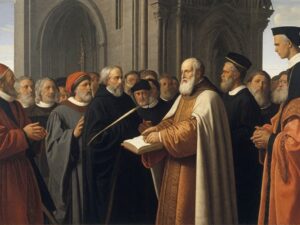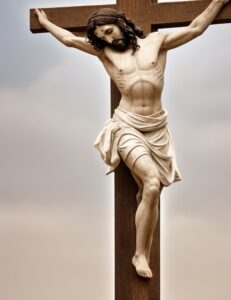Christianity was a single faith. The first schism occurred in 1054 AD when the Eastern Orthodox Church and the Roman Catholic Church split, creating the Eastern and Western branches of Christianity. This division was the result of theological disagreements, with issues like the authority of the Pope and the use of religious icons causing a rift between the churches.
 16th century, led by reformers like Martin Luther, John Calvin, and Ulrich Zwingli, the Protestant Reformation movement challenged the doctrines and practices of the Roman Catholic Church. Luther’s famous Ninety-Five Theses, posted in 1517, criticized the sale of indulgences, caused a wave of religious reform across Europe.
16th century, led by reformers like Martin Luther, John Calvin, and Ulrich Zwingli, the Protestant Reformation movement challenged the doctrines and practices of the Roman Catholic Church. Luther’s famous Ninety-Five Theses, posted in 1517, criticized the sale of indulgences, caused a wave of religious reform across Europe.
The Reformation era saw the birth of Protestantism, a diverse movement encompassing various denominations such as Lutheranism, Calvinism, Anglicanism, and Baptist traditions. These denominations differed in their interpretations of key theological concepts, including salvation, sacraments, and the authority of Scripture. The proliferation of Protestant denominations continued as the movement spread to different parts of the world, adapting to local cultures and beliefs.
In the 18th and 19th centuries, another wave of religion swept through Christianity, leading to the rise of evangelical movements and charismatic expressions of faith. This period witnessed the formation of Methodist, Pentecostal, and Baptist denominations, among others, each highlighting different aspects of Christian experience and worship.
Christian denominations are incredibly diverse, with thousands of distinct groups worldwide. These denominations continue to evolve, influenced by contemporary issues, social changes, and ongoing theological discussions. These denominations share a common heritage, rooted in the teachings of Jesus Christ and the early apostolic church.
Core Beliefs and Practices in Protestantism
Protestants believe in the sole sufficiency and supremacy of Scripture. They adhere strictly to the teachings found within the Old and New Testaments. This commitment to the Bible as the ultimate source of divine revelation underpins various aspects of Protestant faith and practice.
They assert that individuals are justified before God by faith in Jesus Christ alone, not by any merit or good works of their own. The idea is that salvation is a gift from God, received through faith, and not something that can be earned through human effort.
Protestants believe that every believer has direct access to God without the need for intermediaries. This belief empowers individuals to engage with God personally, pray directly, and interpret the Scriptures for themselves. It promotes a sense of spiritual equality among all believers, fostering a strong sense of community and shared responsibility within Protestant congregations.
Worship services in Protestant churches often involve active involvement from the congregation, including communal singing, responsive readings, and active engagement with sermons. They believe in the active involvement of everyone present, fostering a sense of community and shared worship experience.
Protestantism places a strong emphasis on two important sacraments: baptism and communion. Baptism, viewed as a symbol of cleansing and rebirth, is practiced in various forms across Protestant denominations. Communion is seen as a commemoration of Jesus’ last supper with his disciples. While interpretations and practices surrounding these sacraments may vary, their significance in Protestant worship services is universal.
Protestantism vs. Roman Catholicism
Roman Catholicism places a significant acent on the authority of the Pope, whom Catholics regard as the Vicar of Christ on Earth. The Pope serves as the central figure in matters of faith and morals, infallible when speaking ex-cathedra, or officially, on matters of doctrine. This papal authority is a key differentiator between Roman Catholicism and Protestantism, where there is no central ecclesiastical figure with universal authority.
 Catholics believe in the necessity of sacraments, such as baptism and the Eucharist, for salvation. Good works, along with faith, are seen as meritorious and contribute to an individual’s righteousness before God.
Catholics believe in the necessity of sacraments, such as baptism and the Eucharist, for salvation. Good works, along with faith, are seen as meritorious and contribute to an individual’s righteousness before God.
Roman Catholicism adheres to the doctrine of transubstantiation, wherein the bread and wine used in the sacrament become the actual body and blood of Christ during the Mass. This belief is rooted in the teachings of the Church Fathers and the Council of Trent. Protestant denominations maintain a symbolic or commemorative view of the Eucharist. For them, the bread and wine represent the body and blood of Christ, serving as a memorial of Jesus’ sacrificial death.
Catholics uphold the practice of honoring Mary as the Mother of God and venerating saints as intercessors before God. Devotions such as the Rosary and prayers to saints play a central role in Catholic piety. In Protestantism, there is typically a more reserved approach to Mary and the saints, with some denominations rejecting these practices altogether, considering them incompatible with the principle of direct access to God through Christ.
The Roman Catholic Church includes several additional doctrines not found in Protestantism, including purgatory, indulgences, and the infallibility of the Pope. These doctrines have historical roots and have been sources of contention and debate within the broader Christian community.
Protestantism vs. Eastern Orthodoxy
In Eastern Orthodoxy, the authority is distributed across various autocephalous or self-governing churches, each headed by a bishop. Protestants highlight the authority of the Bible and individual interpretation, allowing each believer to engage with scripture directly.
The concept of original sin differs between the two traditions. In Eastern Orthodoxy, the focus is on ancestral sin, where humanity inherits the consequences of Adam and Eve’s disobedience, including mortality and a tendency towards sin. The accent is on healing and purification, achieved through the sacraments and participation in the life of the Church. Many Protestant denominations emphasize the idea of total depravity, where human nature is inherently corrupted by sin, rendering individuals incapable of saving themselves.
Orthodox worship services are highly structured, rich in symbolism, and often involve elaborate rituals, including incense, icons, and chanting. The liturgy is seen as a participation in the heavenly worship. While some, like Lutherans and Anglicans, retain elements of liturgical worship, others, such as Baptists and Pentecostals, prioritize simplicity and spontaneity, focusing on preaching and congregational participation.
In the Eastern Orthodox tradition, sacraments are seen as mysteries, conveying divine grace to the participants. The sacraments are central to the Church’s life and include baptism, chrismation, Eucharist, confession, marriage, ordination, and anointing of the sick.
Denominational Diversity within Protestantism
While all Protestant denominations acknowledge the Bible as the authoritative source of faith, they may vary in their hermeneutical approaches. Some denominations, like fundamentalist and evangelical groups, adhere to a literal interpretation of scripture. Liberal and progressive denominations adopt a more metaphorical or allegorical interpretation, allowing for contextual and cultural considerations in understanding the biblical text.
Traditional Protestant denominations, such as Anglicans and Lutherans, incorporate liturgical rituals, hymns, and sacraments into their worship services, maintaining a sense of continuity with historical Christian practices. Contemporary or charismatic denominations, like Pentecostals and certain Baptist groups, focus on spontaneous worship, expressive forms of praise, and the manifestation of spiritual gifts, creating a vibrant worship atmosphere.
Some denominations, like Calvinists and Reformed churches, emphasize the sovereignty of God and predestination, while others, such as Methodists and Wesleyans, focus on the possibility of resisting God’s grace and the importance of free will.
Protestantism spread globally through missionary activities, leading to the emergence of indigenous denominations influenced by local cultures and customs. African Independent Churches and Korean Presbyterian denominations reflect the fusion of Protestant theology with African and Korean traditions, respectively. These indigenous expressions contribute to the rich tapestry of global Protestantism.
